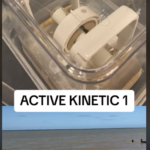Stop a heart attack fast – Cayenne Pepper
Cayenne pepper can actually stop a heart attack in about 60 seconds flat! First the Cayenne pepper must be at least 90,000 heat units or 90,000(H.U.) to be able to stop a heart attack. If the cayenne is at least 90,000 H.U. and the person is still conscious, the recommendation is to mix 1 teaspoon of cayenne powder in a glass of warm water (this is essentially a “cayenne tea”), and give it to the person to drink.
If the person is unconscious then the recommendation is to use a cayenne tincture or extract, again of at least 90,000 H.U., and put a couple of full droppers underneath their tongue full strength. Dr. Christopher stated that, in 35 years of practice he never lost even 1 heart attack case if the person was still breathing when he arrived, and he attributed this to the prudent use of the cayenne pepper.
FREE – A home screening test for Alzheimer’s disease
We have discovered a simple home screening test for Alzheimer’s disease. Read the instructions carefully and have the person being screened answer the questions. The procedure is quite simple, but fully tests the individuals memory from different angles. The answers are virtually self evident, but if someone is having difficulties with memory it should show up quite obviously. Even if you don’t administer the screening test perfectly, it should give you some interesting results. We are not the creators of the screening test so we don’t have any more information than that which is contained in the data we send you.
Email us at info@straussheartdrops.com and ask for the Alzheimer’s Screening Test.
Wash Your Hands Sensibly
Washing your hands frequently is one of the easiest ways to wipe out germs and viruses and reduce your chances of becoming sickened by them. Thorough hand-washing truly is an important step, as you are at far greater risk of passing on an infection by shaking someone’s hand than even by sharing a kiss. One report even found that regular hand washing may be more effective than drugs in preventing the spread of respiratory viruses such as influenza. When you wash up, plain soap and water will do. Do not make the mistake of using antibacterial cleansers, as their widespread use is leading to strains of resistant bacteria, or “superbugs,” which cause the ingredients to lose effectiveness for the times when they really are needed, such as for surgeons prior to surgery. Further, the active ingredient in most antibacterial products is triclosan, an antibacterial agent that kills bacteria and inhibits bacterial growth. But not only does triclosan kill bacteria, it also has been shown to kill human cells. Antibacterial soaps are also no more effective than regular soaps. One study found people who used antibacterial soaps and cleansers developed a cough, runny nose, sore throat, fever, vomiting, diarrhea and other symptoms just as often as people who used products that did not contain antibacterial ingredients. So please avoid making the mistake of using antibacterial liquids and soaps. Washing your hands before touching food which goes into your body and keeping your unwashed hands out of your mouth, is the easiest way to prevent disease.
Vitamin D for high blood pressure
One of the most effective methods I’ve come across during the last few years is vitamin D. Vitamin D does a better job than those patent meds because it targets the problem at the most basic genetic level. That means that something as simple as vitamin D supplementation could make ACE inhibitors (and those ARBs) unnecessary. While it is possible to take too much vitamin D, recent research has reevaluated the safe upper limit for this vitamin, and many experts now agree that it’s 10,000 IU daily. If you want to try an “optimal-vitamin-D” approach to reducing your blood pressure, it’s always best to work with your doctor to monitor your blood level of vitamin D. And be patient: it frequently takes two to three months for significant changes to start taking place and six to eight months for the vitamin D to take full effect.
Pantothenic Acid (Vitamin B5) – a very amazing Vitamin for allergy/sinus problems
A lack of pantothenic acid creates a variety of symptoms one of which seems to be nasal congestion and increased sensitivities to allergens. Our son Tyler has had trouble with nasal congestion for over a year. He did not respond well to any of the allergy/sinus formulas I tried him on. The congestion was worse at night and made it hard for him to breathe when he slept. He also got very congested at school due to all the allergens in the air. I put him on 250 mg. of pantothenic acid at bedtime and his congestion cleared up and he was able to breathe clearly again. I give him an additional 250 mg. before going to school as well.
Here are results of a couple clinical observations: Pantothenic acid supplementation may reduce allergic reactions, especially allergic rhinitis. The majority of over 100 patients with allergic rhinitis who took 250mg of pantothenic acid twice daily had almost instant relief. [Martin W. On treating allergic disorders. Townsend Letter for Doctors Aug/Sept 1991: pp.670-1] Clinical observation: A physician with allergies took 100mg at bedtime and found that his nasal stuffiness cleared in less than 15 minutes and that he stopped awakening at 4 or 5 AM with cough and mucous secretion. He subsequently found that many of his patients also noted significant relief of nasal congestion from supplementation. [Crook WG. Ann Allergy 49: pp.45-46, 1987] Here are other symptoms of pantothenic acid (B5) deficiency… A lack of B5 tends to cause an allergy or sensitivity to citrus fruit. This allergic reaction creates an intense craving for these foods. I often find that people low in B5 will crave orange juice. They often find they have to clear their throat frequently after drinking it. Other foods in the citrus allergy group are lemons, lime, tangerines, grapefruit, pineapple, tomatoes and cantaloupe. When the levels of B5 improve in the body the cravings for these foods decrease as well as the sensitivity to them.
How to prevent brain shrinkage
Brain shrinkage is very common in adults over the age of 60. It occurs when neurons in your brain die or lose their connection to other neurons. Normally this is caused by homocysteine. Basically, the more homocysteine in your blood, the higher your risk of experiencing serious cognitive decline.The average brain shrinks at a rate of .5 percent a year once you hit 60. And some of this “shrinkage” explains why you may not feel as sharp as you did when you were 20. People with this kind of mild cognitive impairment lose brain mass at a rate of 1 percent a year. And those with Alzheimer’s disease experience a loss rate of 2.5 percent per year. Scientists divided volunteers into two groups. One group took vitamin B supplements each day for two years. The tablets contained three components of the B family of vitamins: .8 mg of folic acid, .5 mg of B12, and 20 mg of B6. The other group received a placebo for two years; and to keep things honest, the participants weren’t told whether they received the real vitamin or the placebo.
Vitamin B group shows major improvements
After two years, the participants got another set of MRIs and another round of blood work. The scientists then analyzed the data and here’s what they found:
1. The vitamin B group lowered their homocysteine levels by an average of 23 percent.
2. Homocysteine levels of the placebo group increased by 8 percent.
3. Overall, the vitamin B group experienced 30 percent less brain shrinkage compared to the placebo group.
4. Lastly, people with the most homocysteine at the outset of the study benefited the most. They experienced 50 percent less brain shrinkage compared to the placebo group. According to Professor David Smith and lead scientist from the Oxford team, “We have shown that treatment for two years with B vitamins markedly slows the accelerated rate of atrophy in people with mild cognitive impairment.” He went on to say, “It’s a bigger effect than anyone could have predicted and it’s telling us something biological. These vitamins are doing something to the brain structure – they’re protecting it, and that’s very important because we need to protect the brain to prevent Alzheimer’s.” So think about adding .8 mg folic acid and .5 mg of B12 and 20 mg of B6 into your regimen.
Inexpensive remedy for acne outbreaks
I spent my life from puberty through my mid-forties staying away from wearing pore-clogging products such as cream or liquid foundation because of my oily skin which otherwise would suffer severe acne outbreaks. A friend suggested using an anti-bacterial cleanser and then rinsing the face with simple witch hazel as the astringent which you can find cheaply in any Walmart or other pharmacy. Within weeks of following this simple and relatively inexpensive regimen, my acne was gone and has never returned this past decade+ since. Prior to having been given that cure, a dermatologist had tried to get me to take Tetracycline for a year – it was NOT solving my problem and started to make me feel sick.
Oxygen Solution helps breathing
On my return from the UK last week, I would like to let you know how Oxygen Solution assisted my brother in his breathing. The condition is “fibrosis” and is untreatable according to his doctor. He is on oxygen gas and was constantly breathing through a mask when I arrived. I started him on 20 drops of Oxygen Solution three times per day, and I noticed that by day two he was not reaching for the mask quite so frequently. By day four I was able to persuade him to take a short trip out in the car, which he had not been able to do for about one year. On day six he was walking much better and farther than he had before my visit, and I noticed that the frequency of breathlessness was improved and the severity was diminished. The Oxygen Solution was mainly taken with tap water which I was not satisfied with, and tried to give him as much bottled water as possible.
There is no doubt in my mind that Oxygen Solution helped to improve his quality of life during my stay.
Why Americans are Prone to Heart Disease and Heart Attack?
Americans are prone to heart disease and heart attack because the present American diet is heavily biased toward processed flour, sugar and unhealthy fats which leads to unhealthy eating and a deficiency in the mineral – magnesium, which is vital to having a healthy heart. 75% of Americans are magnesium deficient.
Clinical studies have shown that chronic magnesium depletion has direct consequences for both the heart and the blood vessels. There are 9 things you need to know about magnesium nutrition and heart disease.
1. Heart Attacks: The heart is a very large muscle. Calcium causes muscles to contract and magnesium causes them to relax. If the body is deficient in magnesium, the heart can go into spasm causing a fatal heart attack; beat erratically causing arrhythmia; or beat too slowly (bradycardia) or too quickly (tachycardia).
2. Magnesium prevents blood clot formation and muscle spasms of the heart blood vessels, which can lead to heart attack. One major cause of angina is spasming of the heart’s coronary arteries that are lined with smooth muscles that react to a deficiency of magnesium.
3. Magnesium prevents muscle spasms of the peripheral blood vessels, which can lead to high blood pressure, another risk factor of heart disease.
4. Magnesium prevents calcium buildup in cholesterol plaque in arteries, which leads to clogged arteries.
5. Your body requires magnesium to maintain healthy elastin, which provides essential elasticity in your arteries. Loss of elasticity is a risk factor for heart disease. Loss of elasticity causes inflammation of heart blood vessels, which interferes with blood flow and leads to heart disease.
6. Magnesium deficiency symptoms include leg cramps, eye twitching, fatigue, constipation, insomnia, anxiety, racing heart, and chest pain.
7. High blood pressure can cause stroke and heart attack. Tension in the smooth muscle of blood vessels throughout the body due to magnesium deficiency is a major cause of high blood pressure.
8. Magnesium is a natural calcium channel blocker allowing the proper amounts of calcium in balance with magnesium for heart health.
9. Magnesium is a natural statin (anticholesterol medication). It is necessary for the activity of an enzyme that lowers bad cholesterol (LDL) and triglycerides and raises good cholesterol (HDL).
Magnesium is an extremely safe supplement; its main side effect of loose bowel movements is actually a benefit to 60% of the population that is constipated. It is most commonly taken as a highly absorbable powdered form of magnesium citrate with hot water.
Clinical studies show that treatment with magnesium, taken at the right time and in the right amount, can lessen heart disease risk factors and even save lives. Adequate magnesium nutrition may lessen the need for heroic surgeries and may lessen the need for or even replace high cost medications with their adverse side effects.
A 17-year-old gives his time & strength to help a cerebral palsy child
On Tuesday night, Patty and Rick Parker were in their cramped kitchen with their 8-year-old son Ben. Dinner was over. Bedtime was near. Ben’s twin brother, Sammy, lay on a cot in the narrow hallway just outside the kitchen. Unable to see or speak or control his limbs, he coughed or let out a little moan every now and then. Rick and Patty took turns feeding Sammy, who was being fed through a stomach tube. He cooed when they kissed his face or stroked his cheek, and when they cooed back, he opened his mouth into a wide, joyful O.
A few feet away was the narrow, winding stairway that is the family’s biggest burden lately, and which is where 17-year-old Rudy’s simple, life-changing act of kindness comes in. Until recently, Rick carried Sammy up those 14 stairs to his bedroom each night. But a few months ago, Rick had major surgery for a life-threatening heart condition, and now he can’t lift much at all, let alone a 75-pound child. “We thought Rick was going to die, and we were terrified,” Patty recalled. “We knew right away he had to stop carrying Sam.” Patty couldn’t carry him, either.
Desperate, she called her pediatrician, who put her in touch with Elizabeth Paquette, the nurse at Malden Catholic High School. Paquette said she’d take care of it. The boys at Malden Catholic are taught to embrace service: She’d find plenty of students to help. Rudy Favard was the first kid that Elizabeth Paquette came across after that call.
At Malden Catholic on a partial scholarship from the Catholic Schools Foundation, this son of Haitian immigrants was one of Paquette’s treasures. The linebacker, cocaptain of the football team and honor roll student was always willing to lend a hand. The nurse had barely begun telling Rudy about the Parkers before he said he’d help. Another boy would fill in for Rudy on game nights. And a third boy was on standby in case neither of the others could make it. When Paquette brought the boys to meet the family for the first time, the Parkers cried. “Just to see this outpouring of people,”
Rick Parker began, his eyes welling at the memory. “To see that these people were willing to put their hands and feet to what they believed. . .” It is profoundly isolating to have a child as severely disabled as Sammy. It’s hard even for well-meaning friends to understand the immense strain of his all-consuming needs. Patty and Rick – who tried for 8 years to get pregnant before Ben and Sam were born – grieve for one son’s lost potential every day, even as they struggle to give the other as normal a life as possible.
“You plan for your child’s future, but it’s hard to do that for Sam,” Rick said. “You have this pathway he should have taken, and the pathway he did take, and you don’t want to look at either one.” ” And over it all hangs the certainty that Sammy’s condition will never improve – even as he gets bigger and heavier. Into this world of love and hurt comes Rudy. Four nights a week, he leaves his homework and makes the 10-minute drive to the Parker house. Around 8 p.m., he carries Sammy upstairs, chats a bit, hugs everybody, and heads home to finish his work.
After considerable effort, the Parkers convinced Rudy to take enough money to cover gas, with a little left over. In the few months the Parkers have known him, Rudy has become not just a help with Sammy, but a salve for their pain. He and Rick talk about football. Patty quizzes him on girls. Ben usually parks himself as close to Rudy as possible, looking up at him adoringly. And most nights, Sam will tremble with excitement as Rudy picks him up. “It’s like family,” said the shy senior. It goes both ways: The Parkers were on the field with Rudy’s mother the night Malden Catholic honored its senior football players.
And so Rudy had barely knocked on the door Tuesday night before Ben was at it, jumping up and down, yelling, “Rudy is here! Rudy is here!” He greeted the Parkers, and went over to Sammy, gently lifting the boy’s left arm and sliding his hands under his back, the way Rudy’s father, a professional caregiver, had shown him. He lifted Sammy and held him close to his chest, and as the boy made his joyful O, Rudy carefully maneuvered him around the corners on the narrow stairway.
You couldn’t help but be struck by the painful contrast between the two boys: The robust athlete cradling the pale, helpless child; the young man preparing to go out into the world carrying someone who never will. It’s a comparison lost on nobody, least of all Rudy himself. “Can I ask you something?” he said, sitting in the Parkers’ living room after Sammy was asleep. “Is it OK if this article is more about Sam than me?” Why? “He’s done more for me than I’ve done for him,” Rudy said. “There are times when I don’t want to go to practice, and then I look at Sam. By God’s grace, I can do what I’m doing, so I should keep it up. I’ve never been one to complain a lot, but just seeing Sam reaffirms everything, you know?”
The Parkers won’t have Rudy for long. He’s already been accepted at four colleges, and others are courting him. Where he goes depends on financial aid and football. The Parkers hope to be out of this cramped house and into a bigger one – with no stairs – before Rudy leaves town in search of his degree. Until then, Rudy will bound up to the modest, pale green house on Fairmount Street. He’ll carry Sammy up to his cozy room. Then, for a little while, he’ll carry the Parkers somewhere better, too.
By Yvonne Abraham who is a Globe columnist.
P.S.
This story reminds me of a program recently on Hannity Fox News, where Hannity thanks a Iraq war veteran who lost most of both legs. After hearing the Vet speak and realizing what emotional, mental, family and physical torture the Vet went through serving his country, Hannity said “I hope I never complain about anything again.” If we can show kindness or give help to a family who is burdened by physical disability, let’s do it….surely it’s the least we can do!
Perhaps you could forward the Heartnews to someone who would enjoy it.
Thanks to all who sent in their home remedies….they are the best! If you have any alternative remedies (simple home remedies or other) that you have tried and found successful please forward them to us at: info@straussheartdrops.com
http://WWW.STRAUSSHEARTDROPS.COM






